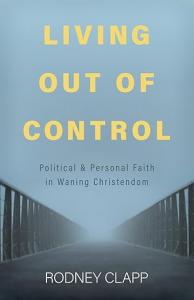Here I begin discussion of a new book: Living Out of Control: Political and Personal Faith in Waning Christendom by Rodney Clapp (Fortress Press, 2025). I introduced the book here a little over a week ago (May, 2025). Rodney is a good friend and a gentleman, a Christian, and a scholar. Here I will describe Chapter One: After Christendom or Waning Christendom? And I invite those who have read it to comment. Others may ask questions.
According to Clapp (from here on I will call him Rodney), “Christendom” is a “time and place in which Christianity prevails.” (1) To pin it down even more, “It is a time and place in which everyone is assumed to be a Christian unless demonstrated otherwise. It is a time and place where government and culture are guided and suffused, at least nominally, by Christian faith.”
Rodney believes Christendom in America is waning as opposed to dead and gone. There are still vestiges of it alive if not well in America. His concern in the book is to guide American Christians into being good Christians (Christians in the right way) in this transitional stage in which Christians are no longer in control of culture. (I assume this condition is not unique to America, so others can join in the discussion insofar as they can identify.)
Rodney concedes that there are powerful people in America who want American once again to be “declared and reembodied as a Christian nation.” (3) One could debate whether it ever really was such (Greg Boyd, for example). However, Rodney believes the high point of Christendom in America was the 1950s and ever since Christendom has been waning in America.
Rodney discusses “three inherent tensions within American Christendom” (6-9). The first one is individualism growing out of revivalism. The second one is the “quasi-libertarianism” inherent in American Christendom. The tension there is a combination of a libertarian ethos with “restrictive public moralism.” The third tension is the “confusion of the church and its mission with American nationalism.” (8)
Rodney clearly does not think American Christian nationalism is a good thing. For him, both the Bible and American tradition view the church, not the nation, as the “city on a hill.” That image and concept was made the nation by Ronald Reagan in 1974. (Rodney provides the specific quotation.)
Rodney ends the chapter by telling what the book is about: “Here, I will try to capture the imagination, to present a different and better story than, say, Christian nationalists, about the possibilities of living out of control. We will reconsider responsibility as a response-ability, introduce prefigurative politics, cheer on a kind of Christian anarchism, remind ourselves of resonance with others and with the world that can only be realized by accepting that we are not in control, hold up a massive potential of friendship in a lonely and desperate society, and lift up again the ongoing riches of celebrating the Eucharist and proclaiming the gospel.” (9)
One question I have, that I hope Rodney will answer, is whether it might be possible for America, or any country, to be suffused with Christian values without Christians being in control. Or at least be theistic in a kind of generic way, but rooted in the Bible, without theocracy. Paul Tillich talked about “theonomous culture” by which he did not mean theocratic culture. He meant a culture that is neither heteronomous (e.g., theocratic) or autonomous (radically pluralistic).
We may find out what Rodney’s answer would be as we continue the book. The first chapter was quite brief. Other chapters are longer. I look forward to reading and commenting on Chapter Two “Responsibility as Response-ability.”
*Note: Comment only if you have read the chapter. Otherwise, you may ask a question. In any case, keep it relatively brief (no more than 100 words), on topic, addressed to me, civil and respectful (not hostile or argumentative), and devoid of pictures or links.*














